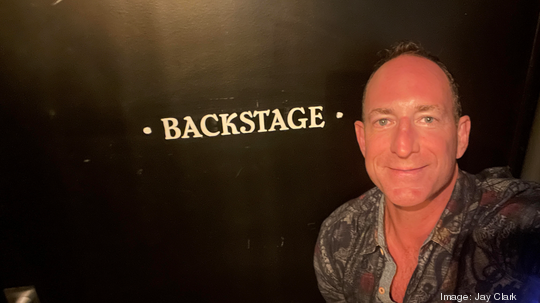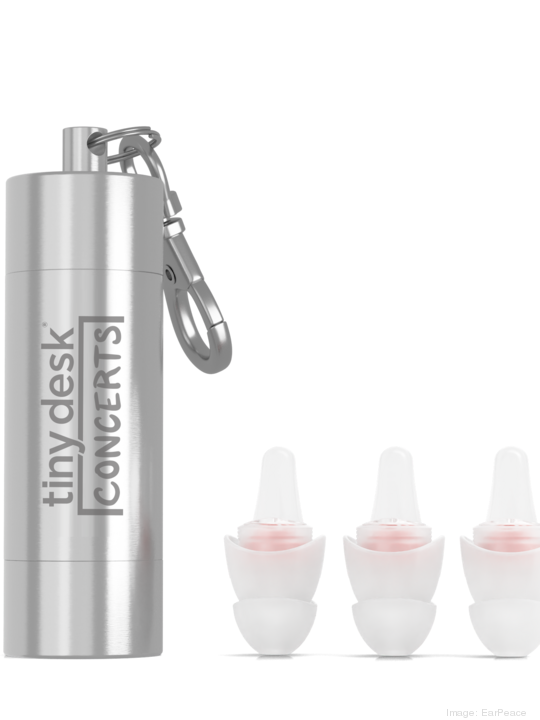
About the business: EarPeace, headquartered in D.C.’s Mount Pleasant neighborhood, designs, creates and sells high-fidelity hearing protection — meaning, the earplugs promise to reduce decibel levels without lowering sound quality. Originally geared to musicians and concertgoers, the company has also found a huge audience among motorcyclists.
How it started: Jay Clark, a D.C. native and 9:30 Club devotee, was a management consultant at IBM Corp. in 2008 — a world away from the career he would ultimately undertake. That year, he was with his girlfriend in Trinidad and Tobago for Carnival and experienced ringing in his ears “louder than the waves.”
But he refused to use foam earplugs, which he said muffle sound, have no air flow and “make you feel like you’re in a box.” Upon their return from the Caribbean, Clark purchased two products in the vein of what he was looking for and, working with an audiologist, industrial designer and attorney (to ensure no patent violations), launched EarPeace in only two months.
“You try it once and you’ll never go to a show without this type of hearing protection again. It just makes a world of difference.”
The pandemic effect: EarPeace was largely created with music in mind, targeting musicians, DJs, technicians, concertgoers — anyone who faces the wrath of a powerful speaker on any kind of a regular basis. “You can go to these shows and feel the same,” Clark said. “Unless there’s some kind of real epic event, you’re not going to lose a noticeable amount of hearing at a single time. Hearing loss is more sinister in that it is longer over time.”
And EarPeace has been hugely successful, selling well more than 1 million earplugs and clearing roughly $10 million a year in sales, Clark said. It sells retail through its website and Amazon, and wholesale, working with the likes of The Anthem, 9:30 Club, Miami Music Week, Lollapalooza and the band Phish, which recently bought 10,000 pairs — EarPeace creates custom cases for bands to sell at their shows.
In March 2020, those music-related sales came to a sudden halt, costing EarPeace about 60% of its business, Clark said.
“Just like everybody else, our entertainment business took it in the teeth,” he said.
The pandemic pivot: Music might have been EarPeace’s focus, but it’s never been the sole revenue generator. It also has product lines for motorcyclists, safety and sleep.
And when the pandemic struck, that’s where it turned its attention.
Clark pulled his eight employees together on Zoom and announced EarPeace was “now going to focus 100% on our motorcycle and safety community.”
“We pivoted to our motorcycle audience, and we changed everything on the website, updated all of our messaging, stopped advertising to music 100%,” he said. “We did all of your standard [search engine optimization] research, optimized everything around motorcycle safety.”
They worked with dozens of motorcycle influencers, Clark said, and grew its motorcycle business 1,500% between 2019 and 2020.
The challenge today: Like virtually every business outside of professional services, EarPeace faces supply chain issues. Setting aside that shipping costs have quadrupled, Clark said, its product is manufactured largely in China, where entire communities can be shut down at a moment’s notice if Covid cases rise.
“Thankfully, we’ve got a ton of inventory,” he said, “but I don’t know how China stops Omicron without constantly shutting down their society. We ordered so much product last year. We were prepared for China to kind of go dark. If your stuff is made in multiple towns, which it generally is, there’s any which way that blackouts can happen.”
Fortunately, EarPeace is a passive product with no electronics, and Clark promises it virtually never wears out. “The only reason you’re going to buy another one is you’ve either lost it or you’re going to buy one for a friend,” he said.
What’s next: EarPeace sells its original model, a pro model and custom molded plugs that require impressions of the ear canal by an audiologist. It just released a series of branded earplugs in partnership with National Public Radio — one case is branded with “Tiny Desk Concerts,” another with “NPR Music.”

The goal, Clark said, is to reach new partners and innovate. EarPeace, for example, has a new filter under development, one it hopes to release before the holidays, that ensures even flatter attenuation — so you lose virtually no quality even as decibels are cut by a dozen or more.
Also, another goal for Clark, he said: to further educate. He recently joined the board of The House Institute, a renowned Los Angeles center for the treatment of ear disease.
Use ear protection at a concert like you would sunscreen on a beach, he said.
“You’ve just got to make people aware that your hearing health can be permanently damaged by doing the stuff that you love to do,” Clark said.
Email mneibauer@bizjournals.com to share your business with us.